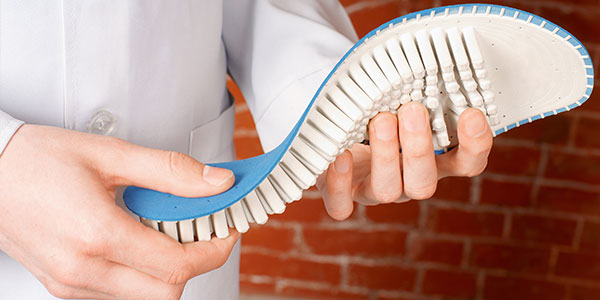Why You May Need Orthotics
When it comes to feet, odds are you’ll experience some pain at some point in your life. In a study by the American Podiatric Medical Association, almost 8 in 10 Americans reported having a foot problem, and half of them say it affected their quality of life and restricted activities like walking, working and exercising.
You may be able to relieve foot pain by wearing better shoes and practicing some basic foot care, like icing, massaging and stretching. Also consider shoe inserts, which are designed to support your arches and cushion your feet.
Ordinary or Customized Inserts
“For some people, over-the-counter inserts fit well and allow them to walk in comfort,” says Amol Saxena, DPM, a podiatrist in the sports medicine department at Palo Alto Medical Foundation. “But for others, the support may be too high or low, or too far forward or back.”

If you’ve tried over-the-counter inserts and still experience foot pain or discomfort, talk to your podiatrist about orthotics, custom foot inserts made from casts or scans of your feet. Orthotics can control abnormal motion in your feet and provide additional, customized support and cushioning.
More Than Foot Shape
To design your orthotics, your podiatrist first evaluates your gait; your feet, ankles and legs; and your specific medical condition.
In the past, many podiatrists created orthotics based only on foot type—whether your feet were flat and overpronated, or high-arched and supinated. But they now follow a different philosophy.
“Research has found that when it comes to orthotics, comfort is the number one factor,” says Dr. Saxena. “Your orthotics don’t have to match your arch type.”
For example, people with flat, overpronated feet should generally wear supportive shoes and inserts most of the time. “But if you’re an experienced runner with flat feet, you might need to wear less supportive orthotics,” says Dr. Saxena. “That’s because you probably have stronger-than-average feet and strike the ground properly when you run.”
On the other hand, if you’re new to running, especially if you’re overweight, more supportive orthotics may help you more. People with arthritic knees tend to do better with more cushioned shoes, while those with Achilles tendon issues do best with a higher heel. “Foot type is just one of many factors when it comes to orthotics,” Dr. Saxena says.
Regardless of your foot type, if you have ongoing pain or a family history of foot problems, contact your podiatrist for an evaluation. If you need orthotics because of an injury, most insurance companies now cover the cost.
Discover Similar Stories
Choose a topic below to read more stories like this one.




